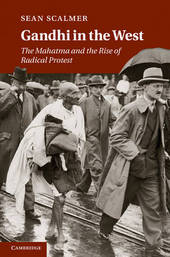
|
Gandhi in the West: The Mahatma and the Rise of Radical Protest
Hardback
Main Details
| Title |
Gandhi in the West: The Mahatma and the Rise of Radical Protest
|
| Authors and Contributors |
By (author) Sean Scalmer
|
| Physical Properties |
| Format:Hardback | | Pages:254 | | Dimensions(mm): Height 235,Width 159 |
|
| ISBN/Barcode |
9780521760911
|
| Classifications | Dewey:303.61 |
|---|
| Audience | | Professional & Vocational | |
|---|
|
Publishing Details |
| Publisher |
Cambridge University Press
|
| Imprint |
Cambridge University Press
|
| Publication Date |
6 January 2011 |
| Publication Country |
United Kingdom
|
Description
The non-violent protests of civil rights activists and anti-nuclear campaigners during the 1960s helped to redefine Western politics. But where did they come from? Sean Scalmer uncovers their history in an earlier generation's intense struggles to understand and emulate the activities of Mahatma Gandhi. He shows how Gandhi's non-violent protests were the subject of widespread discussion and debate in the USA and UK for several decades. Though at first misrepresented by Western newspapers, they were patiently described and clarified by a devoted group of cosmopolitan advocates. Small groups of Westerners experimented with Gandhian techniques in virtual anonymity and then, on the cusp of the 1960s, brought these methods to a wider audience. The swelling protests of later years increasingly abandoned the spirit of non-violence, and the central significance of Gandhi and his supporters has therefore been forgotten. This book recovers this tradition, charts its transformation, and ponders its abiding significance.
Author Biography
Sean Scalmer is a Senior Lecturer in the School of Historical Studies, University of Melbourne. He is author of two books on the history of social movements - Dissent Events: Protest, the Media, and the Political Gimmick in Australia (2002) and The Little History of Australian Unionism (2006). He is also co-author with Sarah Maddison of Activist Wisdom: Practical Knowledge and Creative Tension in Social Movements and co-editor with Stuart Macintyre of What If? Australian History as It Might Have Been (2006).
Reviews'There are many books available on Gandhi, perhaps too many. Very often they add little to the existing literature and are not particularly well written. Scalmer is providing something genuinely new through his analysis of Gandhi and the Mahatma's impact on the rise of radical protest in the West through the framework of globalization. And his writing, while incredibly well informed (and documented), is accessible - in fact it can be read as a ripping good yarn.' Thomas Weber, La Trobe University 'In this fascinating book, Sean Scalmer powerfully reminds us that personal charisma does not effortlessly spread to an adoring public. Far from it. Mapping the complexity of the processes through which the Mahatma's personality and ideas ended up influencing so many different strands of activism all over the world, Gandhi in the West provides a masterly synthesis of historical and socio-political structural analysis.' Mario Diani, Universitat Pompeu Fabra, Barcelona 'Scalmer employs untapped sources from an unexpectedly deep reservoir of American and British media materials to offer an unprecedented contribution to Gandhi scholarship. It fills a crucial gap in our understanding of the Mahatma's reception in the West, bringing us closer to appreciating why his novel method of nonviolence (satyagraha) became universally compelling, constituting an enduring legacy for peace studies and protest movements.' Dennis Dalton, Barnard College, Columbia University '... [an] important and beautifully written book ... a fine example of how to integrate the intellectual history of ideas with the forces of social and political history into a slim and elegant volume.' The Australian '... the author has given a new dimension to Gandhism ... The book demonstrates the significance of non-violence and sheds new light on its usefulness.' The Statesman (Calcutta) 'Scalmer's topic is the way that Western societies responded to Gandhi's words, actions and image, and how those responses influenced political action in Western democracies ... Almost every page is weighted with extensive footnotes that will delight a scholar ... Scalmer writes clearly and concisely, and offers insights that are well worth the read.' Canberra Times 'An excellent book; one of the very few histories to contemplate the evolution of Gandhism over time, the volume is based on numerous contemporary sources.' David Hardiman, American Historical Review '[This] book is a result of careful research and brings together a huge amount of rich and useful material; it shows effectively the transformation of nonviolence over time. A helpful contribution to an unexplored history, the volume offers something new: a major, comparative and long-term study of transnational Gandhism has not been done so far. And this is precisely what Scalmer successfully has done in this book.' Usha Thakkar, Economic and Political Weekly 'The author deserves accolades for producing a meticulously researched work which inscribes in detail the manner in which Gandhi was conceived, refracted and (mis)appropriated in the USA and Britain.' translated from Comparativ '... a lucid, clear and highly persuasive analysis of the ways in which US civil rights protesters and British pacifists adopted Gandhian forms of non-violent protest within their own campaigns ... The result is one of the first comparative and transnational histories of the ideas and practices of non-violence in British and US peace and civil rights protests in the 1950s and 1960s.' Holger Nehring, English Historical Review
|